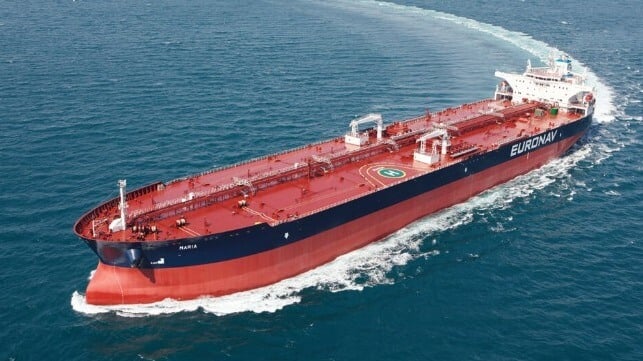Frontline and Euronav Plan $4.2B Merger, Creating Largest Tanker Fleet

Two of the leaders in the crude oil tanker market, Belgium’s Euronav and Norway’s Frontline, signed a terms sheet for a potential merger that would create a leading global independent oil tanker operator with the largest VLCC and Suezmax fleet. News of the agreement on terms comes months after famed investor John Fredriksen invested in Euronav and despite the companies saying as late as last fall that they were not discussing a merger.
The deal is subject to completion of a formal merger agreement, and if completed would create a combined fleet of 146 vessels, consisting of 69 VLCC and 57 Suezmax vessels which Standard and Poors’s estimates would make up roughly 10 percent of the global fleet and 20 LR2/Aframax tankers. The combined company, which would be known as Frontline and be run by the current CEO of Euronav, Hugo De Stoop, would have a market value of $4.2 billion with Euronav shareholders owning approximately 59 percent of the combined company and Frontline’s shareholders 41 percent.
“A combination of Frontline and Euronav would establish a market leader in the tanker market and position the combined group for continued shareholder value creation in addition to significant synergies Commenting on the possible combination,” said John Fredriksen. “The new Frontline would be able to offer value enhancing services for our customers and increase fleet utilization and revenues which would benefit all stakeholders.”
Experts said that the transaction was well-timed as the tanker market is poised to potentially rebound after a nearly two-year down cycle. However, they noted that it would do little to address the largely fragmented market. Analysts said it is an opportune moment as the market rebalances after the sanctions against Russian oil and tankers. Further, there are few newbuilds expected in the tanker segment while the aging fleets are likely to lead to increases in demolitions. Up until now, charter rates have been depressed failing to recover even with the recent rebound in the price of oil.
Commenting on the merger, BIMCO’s analyst Niels Rasmussen told S&P “the tanker market will remain so fragmented that this merger is unlikely to have much impact on market dynamics.”
The companies pointed to strong benefits from the merger and the creation of a larger combined fleet. They expect improved overall utilization and cost synergies including those related to SG&A. The enlarged fleet and combination they said would also provide the company with the strengths to address market trends including digitalization and new low carbon fuels.

that matters most
Get the latest maritime news delivered to your inbox daily.
“This transaction would mark an exciting development for the tanker industry, creating a leading tanker company which would be positioned to serve the needs of customers, support partners, and drive technology and sustainability initiatives to lead the energy transition,” said De Stoop.
Frontline and Euronav are working to agree on and finalize the transaction structure for the business combination. The companies said it was too early to predict when they might reach final terms and noted that the transaction will require shareholder and regulatory approval.
